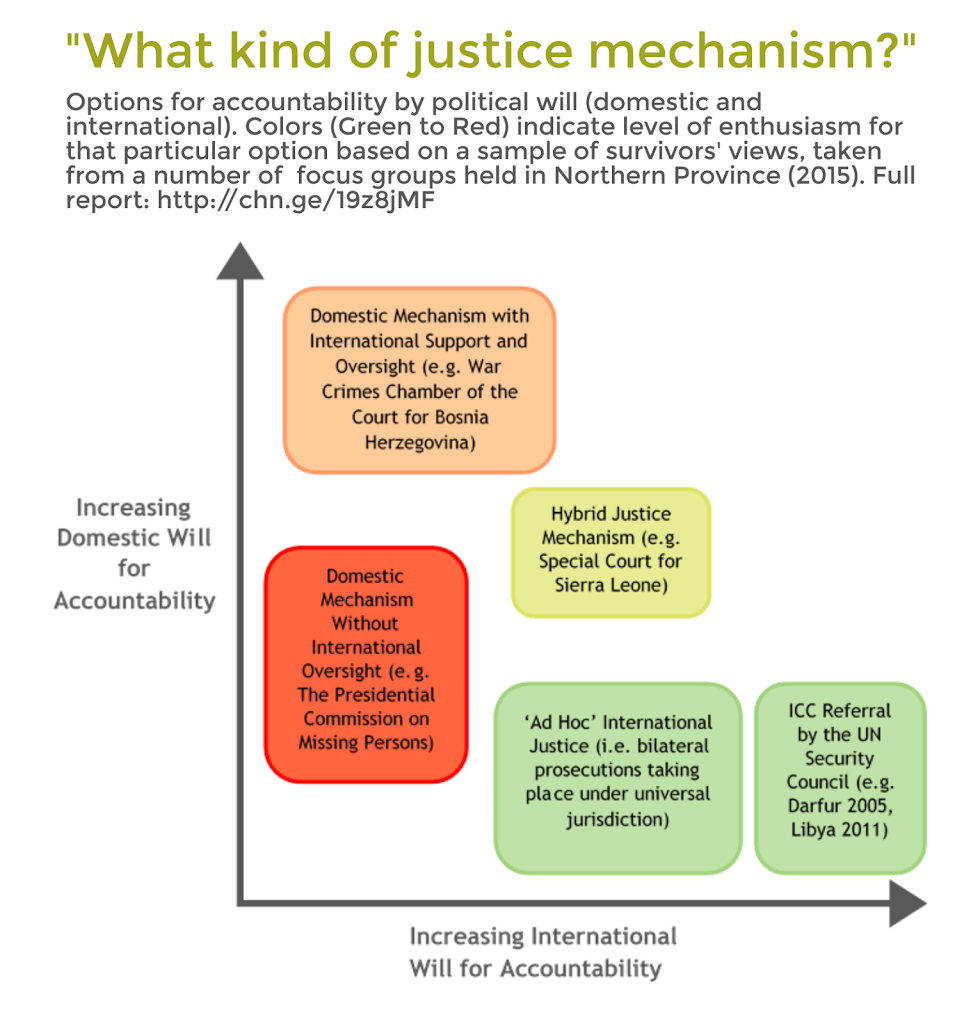- The truth about their missing loved ones
- Acknowledgement that war crimes took place in the final stages of the war
- Prosecution of senior political and military commanders of the Sri Lankan Army and LTTE
The report has been released to coincide with the International Day for the Right to Truth, created by the United Nations to honour victims of gross human rights violations and promote the right to truth and justice. Earlier this month, the UN Human Rights Council deferred the publication of its investigation into war crimes committed in Sri Lanka in 2009. Sirisena has repeatedly stated his preference for a domestic accountability mechanism.
The Sri Lanka Campaign has used the report to create a “Manifesto for Peace” and a petition so that people around the world can express their support and stand with Sri Lanka’s survivors.
Infographics from the report, including views on who should be prosecuted, are featured below.
Fred Carver, Sri Lanka Campaign Director, said:
“This report seeks to put survivors at the heart of discussions over Sri Lanka’s future. These are the people, above all others, that a meaningful reconciliation process must satisfy. They want truth, justice, compensation, and acknowledgement – with truth being the most important.
“They completely rejected a purely domestic accountability process and who can blame them given the repeated failures of the past. Regaining their trust will take political will and time. In the interim, the international community needs to step up to ensure that justice is served.
“It was humbling to see how little desire there is for revenge. All they want is for crimes to be acknowledged and for those they hold most responsible to be brought to justice: former President Mahinda Rajapaksa, former Defence Secretary Gotabaya Rajapaksa, former Commander of the Armed Forces Sarath Fonseka, and TMVP leader Col. Karuna (Vinayagamoorthy Muralitharan). ”
Info Pack:
The Manifesto is included below and is also available here.
The petition is available from: www.change.org/p/the-international-community-meet-the-demands-of-the-survivors-of-sri-lanka-s-civil-war please sign
Infographics are also available below
Selected quotes from survivors
On the need for truth:
“First off, even before clearing the military from the villages, the new government has to tell us what happened to our children”
“Whatever whether this is a national mechanism or an international mechanism – if our children come back that is enough for us.”
On the need for justice:
“There should necessarily be punishment for the responsible persons who committed war crimes in the last days of the war. Only if this happens will there be pressure on the future generation not to follow the same tracks.”
“The inquiries at the national level have only hurt us. Because of this we have no trust. We have trusted different governments time and again.”
“The LTTE – the leaders all ran away. In the end it was innocent people like us who suffered. They took all our money and went.”
On the need for the return of Tamil land:
“This is not that big boss’s land – this is my ancestor’s land. I was born and bred there. I married there and I brought up my children there.”
On the need for compensation:
“We cannot buy the lives we lost but we can buy other things. My husband is missing and all the other women here have the same problem – their husbands are missing. When a head of the house is not there, there are lots of problems.”
On the need for an apology:
“There has been a mistake done. That needs to be acknowledged by the international community. If the people would have not been brought into the ‘safe zones’ many people would have been saved.”
On the need to grieve:
“We are unable to light a single candle to the children we lost. But the military who killed all these people are being praised and their victory is celebrated.”
On the need for a lasting political settlement:
“We do not want any political interference and military interference in our life. This is what we are expecting. We should live peacefully.”
Manifesto for Peace
The Sri Lanka Campaign firmly believes that in order to achieve lasting peace in Sri Lanka, the demands of the survivors of Sri Lanka’s civil war must be met. Those demands are for truth, justice, compensation, and acknowledgement. A true reconciliation process in Sri Lanka would contain the following elements:
- The factual establishment of what took place in the final stages of the war, including the publication of a comprehensive list of the dead, with cause of death where possible, and the names of those detained and those still not accounted for.
- Credible investigation and prosecution of senior political and military commanders of the Sri Lankan Army, and surviving members of the LTTE, for their role in the final stages of the war before a court with international oversight and jurisdiction.
- The absence of the military from the day-to-day life of Tamils in the north and east.
- The return of confiscated land.
- A scheme of compensation for survivors of the war, victims of serious human rights violations and their families, not predicated upon any abandonment of the quest for truth.
- An acknowledgement from the Sri Lankan Government that war crimes took place, and an apology.
- An acknowledgement from the international community that they didn’t do as much as they could have to protect civilians, and an apology.
- The creation of a memorial to the civilian dead, the cessation of triumphalism on the part of the Sri Lankan Government, and an end to the security services’ practice of preventing any public grieving for those who died in the war.
- A fair political solution to the issue of Tamil self-determination.

